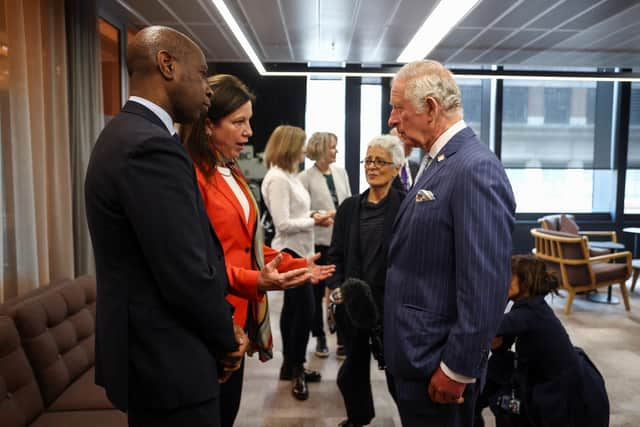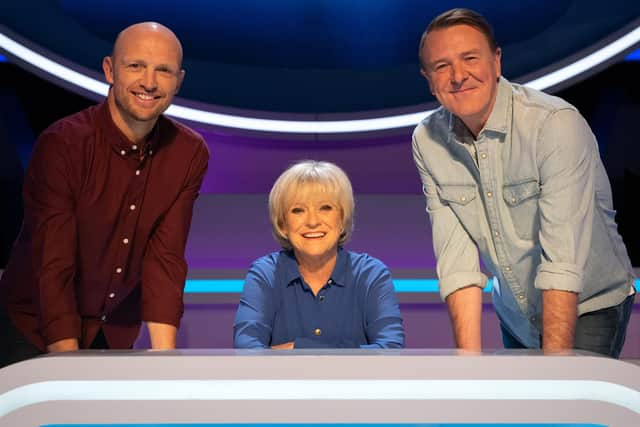BBC has never looked so old, or sounded so vital, in these past few days – Aidan Smith
Filling is difficult. A big story has broken – huge, history-changing stuff, but information beyond the obvious is scarce and the frantic ring-round of experts to be taxied into the studio has only just begun so the presenter must keep talking – continuously, staying on subject, saying the right things, and trying very hard not to keep saying the same things.
So last Thursday, still in the immediate aftershock and needing some words, Myrie suddenly said: “I’m 58. She’s always been my Queen. I’ve never known another.” Myrie wasn’t alone; he had Nick Witchell with him. “Neither have I,” echoed the BBC’s royal correspondent, “and I’m nearly 70.”
Advertisement
Hide AdAdvertisement
Hide AdFor the days which followed, the average age of the people glimpsed or heard on the Beeb shot up dramatically and it should stay this way until next Monday’s funeral and the reflections afterwards.


There have been biographers, historians and veteran presenters from momentous Royal dramas of the past. There have been toppled premiers, amusing anecdotes at the ready, retired members of the Royal hack pack and leading authorities on ye olde monarchical customs and quirks.
There have been former members of the Royal household, discretion their watchword, friends from a carefree youth, just a few years before the newly-crowned Elizabeth II had to start holding her own in weekly conversations with Winston Churchill – and my personal favourite, the Rev David Barr, minister of Glenmuick Parish Church, Ballater, who told how the Queen had confided in him that Balmoral was the one place in her kingdom where she could pop her crown on a peg.
“Ex-Marine, 6ft 3in, a boy from the East End of Glasgow,” was how Barr described himself to viewers. Yet he’d climbed to the top of his church, rang the bell once for each year of her reign and “cried my eyes out”.


Almost to a man this procession was made up of men. Silver-haired men telling stories celebrating an era and commemorating its end. The state broadcaster might never have looked or sounded so old – or been so enlightening, enrapturing and unmissable.
Actually, let’s not say old, rather: mature, experienced, lived in. But anyone unaware of the culture wars, the rows over wokeism and inclusivity and most critically the mania over youth – and who had turned on the the TV or the radio last Thursday to sample the BBC for the first time – would be astonished to learn about the accusation, levelled at the Corporation for some years now, that it is ageist.
The latest controversy had been rumbling just 24 hours before with irate viewers upping calls for the return of Sue Barker to Question of Sport as Beeb-bashing columnists reacted with glee to the revamping’s poor audience figures.
Barker, 66, had fronted the show for 24 years – a queenly rule for a TV presenter. The end was messy, with the host and team captains being urged to quickly sign a statement that they’d agreed to step aside and Barker putting it bluntly: “I was sacked.”
Advertisement
Hide AdAdvertisement
Hide AdCraving a younger audience, the Beeb replaced her with the comedian Paddy McGuinness. He doesn’t have a sports background – or anything like Barker’s peak five million viewers. Just 850,000, which must put the world’s longest-running sports quiz under threat.
There has been similar upset among Radio 2 listeners over the departures of Steve Wright and Paul O’Grady. The latter, 67, had been with the station for 14 years while Steve Wright in the Afternoon will end this month after a 12-year stint on Radio 1 and almost double that on the sister station for the 68-year-old DJ.
This trio of sixtysomethings are just the latest to be moved on by the Corporation as it desperately seeks the youth vote. But there’s little evidence that any of the “refreshings”, as they’re termed, are succeeding.
Last month Ofcom reported that the 16-24 age group spend just 53 minutes watching traditional broadcast TV. They prefer to scroll TikTok and some even get their news from the social media site. By contrast, those over 65 spend seven times as long in front of channels like BBC1 and ITV, viewing almost six hours a day.
The TikTokers in our house watched more TV than they ever did previously during the pandemic. They were encouraged in this by my wife’s determined efforts to recreate every night a cosy family tableau round the goggle-box from the front cover of Radio Times, circa 1957, the availability of box-sets featuring smart, funny young people (Modern Family, Schitt’s Creek, The Durrells) – and the fear the world might end.
When it didn’t, they drifted away from the telly and back to their bedrooms and their phones – and didn’t return until last Thursday and those bulletins of mounting graveness from outside the gates of Balmoral.
They will probably drift away again and sooner or later the BBC will have to ask itself if there’s any real point in trying to get down with the kids when they’re simply not interested in old media.
It’s kind of ironic that the Beeb, seemingly so casual about continuity in some well-loved programmes, has stepped up when needed to nurse the nation through the biggest break with tradition for seven long decades.
Advertisement
Hide AdAdvertisement
Hide AdMy wife and I have never been asked as many questions as the sheer number which have popped from young mouths these past few days, while events, rituals and ceremonies not witnessed by the country for a generation have been acted out. Invariably unable to answer, we’ll say: “Hang on, someone from the BBC will tell us what’s happening in just a minute…”
Comments
Want to join the conversation? Please or to comment on this article.
